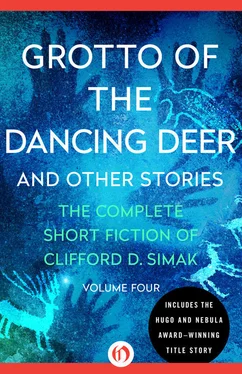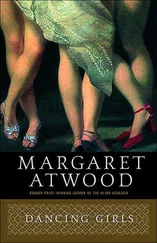“I have to stand,” said Lester.
So I left him standing there and sat down in the rocker.
“What does Wilbur eat?” I asked. “He must be getting hungry.”
The robot opened a door in the middle of his chest and took out a funny-looking bottle. He shook it and I could hear something rattling around inside of it.
“This is his nourishment,” said Lester. “He takes one every day.”
He went to put the bottle back and a big fat roll fell out. He stooped and picked it up.
“Money,” he explained.
“You folks have money, too?”
“We got this when we were indoctrinated. Hundred-dollar bills.”
“Hundred-dollar bills!”
“Too bulky otherwise,” said Lester blandly. He put the money and the bottle back into his chest and slapped shut the door.
I sat there in a fog. Hundred-dollar bills!
“Lester,” I suggested, “maybe you hadn’t ought to show anyone else that money. They might try to take it from you.”
“I know,” said Lester. “I keep it next to me.” And he slapped his chest. His slap would take the head right off a man.
I sat rocking in the chair and there was so much to think about that my mind went rocking back and forth with the chair. There was Wilbur first of all and the crazy way he got drunk, and the way the Widow Frye had acted, and all those hundred-dollar bills.
Especially those hundred-dollar bills.
“This indoctrination business?” I asked. “You said it was bootleg.”
“It is, most definitely,” said Lester. “Acquired by some misguided individual who sneaked in and taped it to sell to addicts.”
“But why sneak in?”
“Off limits,” Lester said. “Outside the reservation. Beyond the pale. Is the meaning clear?”
“And this misguided adventurer figured he could sell the information he had taped, the—the—”
“The culture pattern,” said Lester. “Your logic trends in the correct direction, but it is not as simple as you make it sound.”
“I suppose not,” I said. “And this same misguided adventurer picked up the money, too.”
“Yes, he did. Quite a lot of it.”
I sat there for a while longer, then went in for a look at Wilbur. He was fast asleep, his catfish mouth blowing the whiskers in and out. So I went into the kitchen and got myself some supper.
I had just finished eating when a knock came at the door.
It was old Doc Abel from the sanitorium.
“Good evening, Doc,” I said. “I’ll rustle up a drink.”
“Skip the drink,” said Doc. “Just trot out your alien.”
He stepped into the living room and stopped short at the sight of Lester.
Lester must have seen that he was astonished for he tried immediately to put him at ease. “I am the so-called alien’s robot. Yet despite the fact that I am a mere machine, I am a faithful servant. If you wish to tell your sadness, you may relate it to me with perfect confidence. I shall relay it to my master.”
Doc sort of rocked back on his heels, but it didn’t floor him.
“Just any kind of sadness?” he asked, “or do you hanker for a special kind?”
“The master,” Lester said, “prefers the deep-down sadness, although he will not pass up any other kind.”
“Wilbur gets drunk on it,” I said. “He’s in the bedroom now sleeping off a jag.”
“Likewise,” Lester said, “confidentially, we can sell the stuff. There are people back home with their tongues hanging to their knees for this planet’s brand of sadness.”
Doc looked at me and his eyebrows were so high that they almost hit his hairline.
“It’s on the level, Doc,” I assured him. “It isn’t any joke. You want to have a look at Wilbur?”
Doc nodded and I led the way into the bedroom and we stood there looking down at Wilbur. Sleeping all stretched out, he was a most unlovely sight.
Doc put his hand up to his forehead and dragged it down across his face, pulling down his chops so he looked like a bloodhound. His big, thick, loose lips made a blubbering sound as he pulled his palm across them.
“I’ll be damned!” said Doc.
Then he turned around and walked out of the bedroom and I trailed along behind him. He walked straight to the door and went out. He walked a ways down the driveway, then stopped and waited for me. Then he reached out and grabbed me by the shirt front and pulled it tight around me.
“Sam,” he said, “you’ve been working for me for a long time now and you are getting sort of old. Most other men would fire a man as old as you are and get a younger one. I could fire you any time I want to.”
“I suppose you could,” I said and it was an awful feeling, for I had never thought of being fired. I did a good job of janitoring up at the sanitorium and I didn’t mind the work. And I thought how terrible it would be if a Saturday came and I had no drinking money.
“You been a loyal and faithful worker,” said old Doc, still hanging onto my shirt, “and I been a good employer . I always give you a Christmas bottle and another one at Easter.”
“Right,” I said. “True, every word of it.”
“So you wouldn’t fool old Doc,” said Doc. “Maybe the rest of the people in this stupid town, but not your old friend Doc.”
“But, Doc,” I protested, “I ain’t fooling no one.”
Doc let loose of my shirt. “By God, I don’t believe you are. It’s like the way they tell me? He sits and listens to their troubles, and they feel better once they’re through?”
“That’s what the Widow Frye said. She said she told him her troubles and they seemed to go away.”
“That’s the honest truth, Sam?”
“The honest truth,” I swore.
Doc Abel got excited. He grabbed me by the shirt again.
“Don’t you see what we have?” he almost shouted at me.
“We?” I asked.
But he paid no attention. “The greatest psychiatrist,” said Doc, “this world has ever known. The greatest aid to psychiatry anyone ever has dredged up. You get what I am aiming at?”
“I guess I do,” I said, not having the least idea.
“The most urgent need of the human race,” said Doc, “is someone or something they can shift their troubles to—someone who by seeming magic can banish their anxieties. Confession is the core of it, of course—a symbolic shifting of one’s burden to someone else’s shoulders. The principle is operative in the church confessional, in the profession of psychiatry, in those deep, abiding friendships offering a shoulder that one can cry upon.”
“Doc, you’re right,” I said, beginning to catch on.
“The trouble always is that the agent of confession must be human, too. He has certain human limitations of which the confessor is aware. He can give no certain promise that he can assume the trouble and anxiety. But here we have something different. Here we have an alien—a being from the stars—unhampered by human limitations. By very definition, he can take anxieties and mother them in the depths of his own non-humanity …”
“Doc,” I yelled, “if you could only get Wilbur up at the sanitorium!”
Doc rubbed mental hands together. “The very thing that I had been thinking.”
I could have kicked myself for my enthusiasm. I did the best I could to gain back the ground I’d lost.
“I don’t know, Doc. Wilbur might be hard to handle.”
“Well, let’s go back in and have a talk with him.”
“I don’t know,” I stalled.
“We got to get him fast. By tomorrow, the word will be out and the place will be overrun with newspapermen and TV trucks and God knows what. The scientific boys will be swarming in, and the government, and we’ll lose control.”
“I’d better talk to him alone,” I said. “He might freeze up solid if you were around. He knows me and he might listen to me.”
Читать дальше












